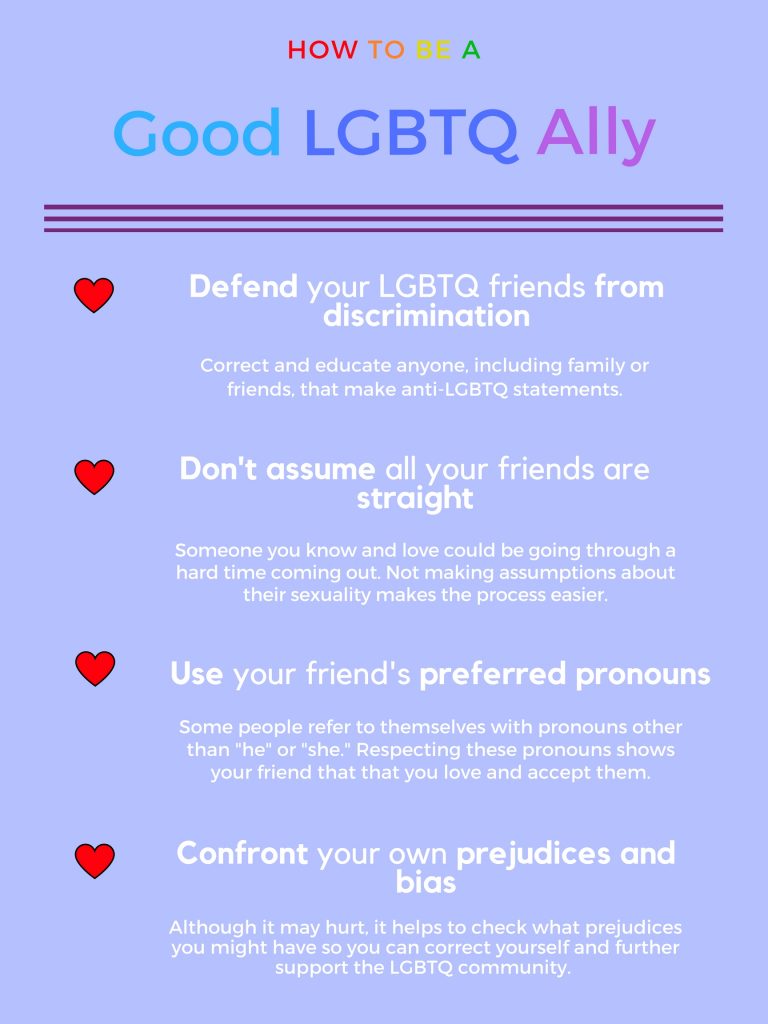Miami Beach Gay Pride took place this past weekend, and was accompanied by sequins, rainbows and parade floats. But we need to understand that Pride is equal parts a celebration, a protest and a community building event. Pride is held each summer to commemorate the Stonewall Riots of 1969 where more than 1,000 people took to the streets of Greenwich Village in one of the first organized displays of LGBTQ+ protest.
Today, Pride is a time where LGBTQ+ people come together to be surrounded by the family they choose. While much of the family consists of LGBTQ people alike, it can also consist of allies.
But, there are allies — people who give the effort to bring about a positive contribution to social justice — and then there people who say they support LGBTQ, but are only promoting Pride as a means to an ends. Being an ally to the LGBTQ community means more than finding a gay best friend to parade around as a trophy of your support.
Befriending a gay man just for the sake of having a sitcom-style life with the token gay best friend doesn’t legitimize your status as an ally; the same way befriending a person of color doesn’t automatically negate the possibility of being racist or having racist ideologies.
Acknowledge that “ally” is not an identity — an ally means actively advocating for the members of each section of the community for their sake, not to boost your own appearance as a progressive rebel to conservative society. As an ally, there are numerous things you can do to help the LGBTQ community.

One way is to be careful where you spend your money. There are some businesses, such as Chick-Fil-A, that will donate some of their profits to organizations that actively work against the LGBTQ community. Don’t give your money to places that won’t bake cakes for gay couples or allow transgender persons into their establishments.
Even your interactions matter, like when making introductions. Refrain from saying things like, “I’d like you to meet my lesbian friend, Cynthia.”
Not only is it rude, but it’s unfair to the LGBTQ+ person because it’s personal information that only needs to come out in introductions if that person is the one saying it.
Heterosexual people certainly don’t go around publicly announcing your sexual preferences or other personal identities to other people.
Additionally, you can’t always know or assume what someone’s pronouns are by looking at them. Asking and correctly using someone’s pronouns is one of the most basic ways to show your respect for their gender identity.
When someone is referred to with the wrong pronoun, it can make them feel disrespected, invalidated and alienated, among others. Bottom line: understand that knowing marginalized people doesn’t equal being inclusive. If you don’t understand something, don’t fake it, and certainly don’t go parading around fake support.
Be honest and educate yourself about the LGBTQ community and its issues. We’ve come a long way fighting discrimination and advocating for civil rights. Be aware of not only your boundaries, but also the power you have as an ally. Use your privilege to uplift others and help bring change.
Infographic created by Caroline Lozano.
Photo by Josh Wilburne on Unsplash.





Be the first to comment on "Being an ally goes beyond having a gay best friend"